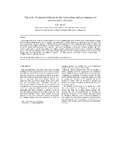| dc.contributor.author | Ngowi, A.B. | |
| dc.date.accessioned | 2008-10-30T10:07:18Z | |
| dc.date.available | 2008-10-30T10:07:18Z | |
| dc.date.issued | 2007 | |
| dc.identifier.citation | Ngowi, A.B. (2006) The role of trustworthiness in the formation and governance of construction alliances, Building and Environment Vol.42, pp.1828–1835 | en |
| dc.identifier.issn | 0360 1323 | |
| dc.identifier.uri | http://hdl.handle.net/10311/260 | |
| dc.description.abstract | The ensuing globalization of the construction industry as well as the highly fragmented and divisive nature of the industry are among
the forces that are influencing it to seek management approaches such as strategic alliances that could leverage the capabilities of the
various participants. This paper reports on a study that investigated the factors considered by firms when selecting alliance partners, and
the influence of trustworthiness in deciding the governance structures of the alliances. A study of key partners in existing and potential
construction alliances in Botswana that was carried out using a postal questionnaire and structured interviews determined that firms
consider complementarity, similar status, indirect prior alliance experience and reputation before they make a selection of an alliance
partner. The study also determined that partner trustworthiness eliminates the need of contractual clauses in the operation of the
alliances. The paper concludes that trustworthiness of a partner is an influencing factor in all stages of the alliance development. | en |
| dc.language.iso | en | en |
| dc.publisher | Elsevier Ltd; http://www.elsevier.com/wps/find/journaldescription.cws_home/296/description#description | en |
| dc.subject | Joint ventures | en |
| dc.subject | Strategic alliances | en |
| dc.subject | Partnering | en |
| dc.subject | Trustworthiness | en |
| dc.subject | Construction industry | en |
| dc.title | The role of trustworthiness in the formation and governance of construction alliances | en |
| dc.type | Article | en |

